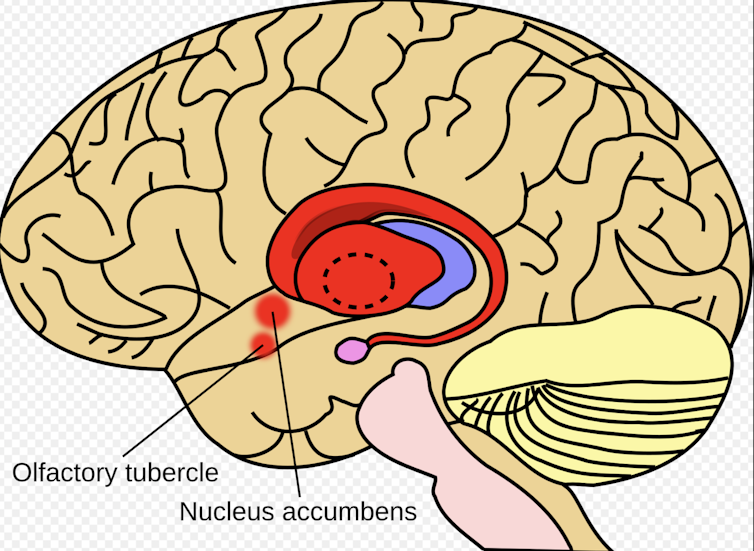Momentary shifts in mood profoundly alter the brain’s response to pleasure in people with bipolar disorder.

Moods and emotions play an important role in our day-to-day life. They even influence how we experience things – for instance, whether we start the day feeling hopeful and energised or grumpy and lethargic. This can affect whether we interpret events in a positive or negative light.
In people with bipolar disorder, however, mood can change quickly and unpredictably, so that you get “stuck” in a low or high mood, which can have significant consequences. Yet researchers don’t know exactly what drives such extreme shifts in mood.
Now our new study, published in Biological Psychiatry Global Open Science, has uncovered the brain areas that bias mood and the brain’s response to pleasure in bipolar disorder. It is possible that our findings may one day lead to better treatments.
We all experience shifts in mood throughout the day. When we are in a good mood, we tend to view things more favourably – if we happen to experience a streak of success and are on a roll, our good mood similarly rolls over and gains momentum.
Equally, when we are in a bad mood, we tend to perceive bad outcomes as even worse than they are – this negative mood similarly gains momentum and might make us feel worse.
Such momentum in mood can bias how we perceive events and the decisions we make. Imagine going into a new restaurant for the first time. If you happen to be in a fantastic mood, you are likely to perceive the experience as much better than it actually is. This might set up your expectations that a future visit would give you a similar, positive experience, and leave you feeling disappointed if that is not the case.
The process by which mood biases the perception of pleasurable or rewarding experiences has been thought to be amplified for people with bipolar disorder, who can experience moods that can quickly climb to extremes.
We know from prior research that these extreme mood cycles can be triggered from life experiences involving important goals – such as doing well in exams, buying a property or getting a promotion. This could be either by attaining them or failing to attain them.
Bipolar disorder has been described by those who experience it as a double-edged sword. Alongside periods of fluctuating (hypo)manic or depressive moods, many people with bipolar disorder vigorously pursue goals that are important to them and are often successful as a result.
But what goes on in the brain when our moods shift from one second to the next in response to pleasurable experiences?
Pleasurable and rewarding experiences activate specific circuits in the brain that involve a neurochemical called dopamine. This helps us learn that the experience was positive and that we should repeat the actions that give rise to this pleasurable experience.
One way to measure the brain’s response to reward is to examine activity in the ventral striatum – the key area of our reward system responsible for the feeling of pleasure.
Our study aimed to find out what goes on in the ventral striatum in 21 participants with bipolar disorder and 21 control participants when momentary shifts in mood occur. We wanted to gauge this down to the order of seconds, in response to monetary rewards.
Our participants were asked to play a computer game, involving gambling to win or lose real sums of money, while in a brain scanner. We used a technique called functional magnetic resonance imaging (fMRI) to measure blood flow in the participants’ brains in order to determine which areas were active.
We also used a mathematical model to calculate participants’ “momentum” in mood – how great they felt as they kept winning.
Across all participants, we observed a heightened brain activity in an area of the brain which is involved in the experience and awareness of transient mood states – the anterior insula.
However, it turns out that during periods of upwards momentum, where participants had won many times, the ventral striatum showed a strong, positive signal only in participants with bipolar disorder. This means that participants with bipolar disorder experienced a heightened feeling of reward.

We also found that the amount of communication between the ventral striatum and anterior insula was reduced in participants with bipolar disorder. In the control group, both the ventral striatum and anterior insula were firing up in union.
This suggests that control participants were better able to keep their mood in mind when perceiving rewards in the task. So while participants may find it rewarding to win, we think they were more aware that this put them in a better mood. This might help them adjust quickly to an environment that changes (for the better or worse) and protect them from expectations of getting a future reward becoming very inflated.
However, this was the opposite for participants with bipolar disorder. This means they were less able to set their mood aside from how exciting or pleasurable they found the rewards to be.
These findings may help to explain why people with bipolar disorder can get stuck in a vicious cycle where their mood escalates and sometimes causes them to take bigger risks than usual.
The same mechanism that triggers a positive mood may also trigger a negative mood cycle. If you are on a winning streak and lose unexpectedly, mood may shift towards a negative cycle, with expectations becoming negative and behaviour changing accordingly. However future studies will need to investigate negative mood cycles more specifically.
Our findings may also aid the development of interventions that help people with bipolar disorder to better decouple their mood from their perceptions and decisions, without dampening down exciting experiences. Since dopamine neurons are closely connected to the ventral striatum, it will be interesting to see if dopamine medication could ameliorate this mood bias.
Hestia Moningka does not work for, consult, own shares in or receive funding from any company or organisation that would benefit from this article, and has disclosed no relevant affiliations beyond their academic appointment.